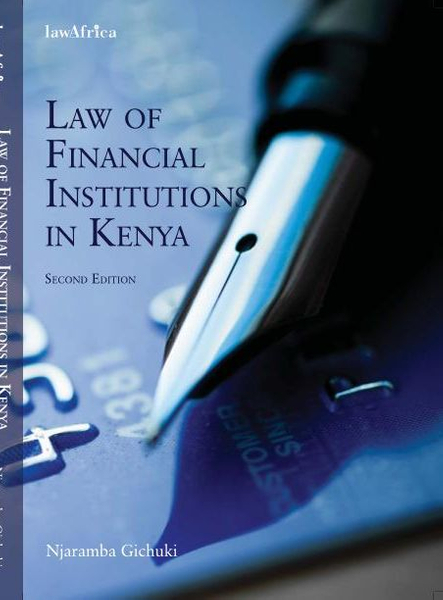The law of financial institutions in Kenya is contained in statutes as well as case law. The common law of England also plays an important role in the substantive law. Banking practice is elevated to the position of law (almost). The Central Bank of Kenya has powers to make guidelines and directives for the financial sector. When this is done, they operate within the confines of the law as the same are applied under the provisions of the Central Bank of Kenya Act, the Banking Act and the other relevant Acts.
Law of Financial Institutions in Kenya-Njaramba Gichuki
KSh 1,500.00
The law of financial institutions in Kenya is contained in statutes as well as case law. The common law of England also plays an important role in the substantive law. Banking practice is elevated to the position of law (almost). The Central Bank of Kenya has powers to make guidelines and directives for the financial sector. When this is done, they operate within the confines of the law as the same are applied under the provisions of the Central Bank of Kenya Act, the Banking Act and the other relevant Acts.
2 in stock
Related products
-
Principles of Constitutional Law -(Law africa)
KSh 2,700.00The main aim of this book is to provide the reader with knowledge and understanding of some of the key concepts, doctrines and principles which make up that corpus of law known as constitutional law. Another aim is to develop a sound academic basis for the study of subjects based on public law, such as political science and international relations.
-
Intellectual Property Law in East Africa
KSh 3,217.00The past half century in Uganda has witnessed both concern and interest in copyright and neighbouring rights. This is evident in the laws and treaties initiated by both the Uganda Government and the international community, aimed at enabling copyright holders to realize the benefi ts of their intellectual works.
-
THE NEW CONSTITUTIONAL LAW OF KENYA: PRINCIPLES, GOVERNMENT AND HUMAN RIGHTS
KSh 2,400.00On 27 August 2010, a new Constitution for Kenya was promulgated. The Constitution seeks to re-orient the country by establishing a robust dispensation for good democratic governance amenable to the exercise of human rights. This book is tailored to unveil to the reader the fundamental normative and institutional frameworks of Kenya’s new Constitution. Not only does it define key concepts in constitutional law, generally, it also details how government in Kenya has been restructured and re-organised to give effect to the traditional principles that form the basis of constitutional law.
The golden thread that cuts across the various chapters of the book is the emphasis that good constitutions anchor certain tenets that have garnered recognition as hallmarks of democratic dispensation.These hallmarks include the concept of separation of powers; the doctrine of the rule of law; constitutionalism and human rights. These attributes have largely been secured by the 2010 Constitution. Thus, this book is expected to contribute to this new promise by making knowledge on the Constitution accessible through breaking down and contextualising its provisions. It is certain to be useful to law and government students, lawyers, researchers and other persons who seek to understand the new constitutional order. Morris Kiwinda Mbondenyi, LL.D., LL.M. (UNISA), LL.B. (Moi), Senior Lecturer and Head of Department, African Nazarene University. J Osogo Ambani, LL.D. (Cand), LL.M. (UP), LL.B. (UoN), Lecturer, MoiUniversity School of Law. -
A Guide to Criminal Procedure in Uganda
KSh 2,700.00This book has been written primarily for Police Officers, Public Prosecutors and Magistrates who bear the main responsibility for enforcing the law and administration of criminal justice. Police Officers will find the Chapters on Police Investigations, arrest, searches, and charges of special interest. Public Prosecutors should derive ample guidance from the Chapters on conduct of public prosecutions, control of public prosecutions, constitutional rights of accused persons, attendance of witness, conduct of trial before Magistrates’ Courts, and examination of witness. Magistrates should benefit by reading especially chapters on jurisdiction, pleas, bail, conduct of trials, preliminary proceedings, judgment, appeals and sentencing process.
-
Administrative Law and Process in a Nutshell
KSh 8,190.00This book offers a concise, knowledgeable guide to administrative law. In straightforward, readable prose, the authors not only summarize the dominant statutes and case law in the area, but also discuss informal administrative processes and the background realities of the regulatory state. Students can use the book as a complement to any major casebook, and practitioners will also find it an excellent brief introduction to this complex and important subject.
-
Criminal Law-William Musyoka
KSh 2,700.00This text is designed to expose the Kenyan law on criminal responsibility and to define the common and key offences created by Kenyan statutes. An attempt has been made to rely mainly on Kenyan case law, but there is reference to cases from the other East African countries and the rest of the Commonwealth. The book is meant for law students undertaking the LL.B. programme. Legal practitioners, judicial officers, law enforcement agents and other persons with an interest in criminal law and justice will also find it useful.
-
Equity and Trusts-DAVID BAKIBINGA
KSh 2,800.00The book provides an overview of equitable principles in Uganda and links this with the maxims of equity and the distinction between equitable and legal interests. The book will benefit students offering Equity and Trusts
and Estate Planning in East African universities as well as legal
practitioners, insurance, social security and corporate operators. -
Accounting for Lawyers
KSh 1,200.00This book recognizes the fear faced by many law students and to a great extent the practicing lawyer concerning accounting and seeks to provide a basic and simplifi ed understanding to accounting principles for those who have no previous accounting background while at the same time introducing some advanced topics for students with previous exposure and thus a deeper scope of accounting principles. The book also sought to incorporate key accounting principles and relevant changes and developments in the Kenyan industry. A comprehensive glossary of terms has been provided to assist learners in grasping key meanings and explanations










Be the first to review “Law of Financial Institutions in Kenya-Njaramba Gichuki”